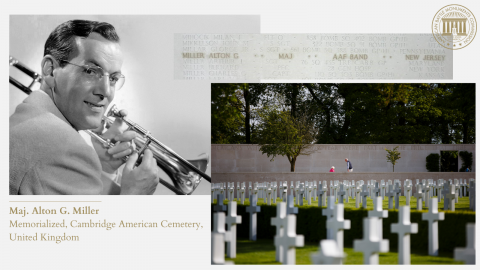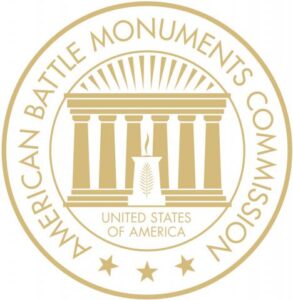In recognition of Jazz Appreciation Month (April), the American Battle Monuments Commission honors Major Alton Glenn Miller, memorialized on the Wall of the Missing in the Cambridge American Cemetery. Like so many in his generation, Miller voluntarily left behind the comforts of home and career to “do his part” during World War II. While he was in route to coordinate his unit’s redeployment, his plane went down over the English Channel on 15 December 1944.
Miller was born in Iowa in 1904 and raised there and in Nebraska, Missouri and Colorado. While a high school senior in Fort Morgan, Colorado he took an interest in dance band music and formed a band of his own with some classmates. He became a professional musician and toured with several groups. He gained recognition as a solo trombonist but turned his attention to arranging and composing. In these he excelled, and Miller rubbed shoulders with some of the greatest names in popular music as he wrote for and participated in bands recording, on tour, or supporting plays and movies.
In 1938 Miller formed his own band in New York, developed a unique sound, and began recording for Bluebird Records. Performances to sell-out crowds at major venues followed. Miller’s “big band” soon became an iconic representative of “swing music”, a genre of jazz dominant in the 1930’s and 1940’s. Swing was easy to dance to, enhancing its value as popular entertainment. Where bands weren’t playing “jukeboxes” might be, automatically cycling records when coins were inserted. By 1940 a major fraction of the records on jukeboxes were Glenn Miller’s. He had 69 “top ten” hits in four years.
At age 38 and the height of his career Miller volunteered for the U.S. Army. He wanted to entertain troops with a “modernized Army band”. After successful early initiatives in that regard, Miller was promoted to major, formed a 50-piece Army Air Force Band, and deployed with it to England. Here his band gave 800 performances, was repeatedly recorded, and became a recurrent feature of American Forces Network radio broadcasting. Miller’s music was hugely popular, and characterized as the greatest morale builder in the theater other than letters from home.
As Allied forces pushed across France and the greater mass of American servicemen shifted to the continent, Miller committed to redeploy his band from England to Europe. On 15 December 1944 he took off from RAF Twinwood Farm in a single-engine plane to make arrangements in France. The plane disappeared over the English Channel. Most likely it hit unexpectedly cold air and its carburetor froze. Miller was widely mourned at home and abroad, and remains inspirational in the world of popular music. He embraced his duty, and remains honored alongside others who did so as well.

 An official website of the United States government. Here's how you know.
An official website of the United States government. Here's how you know. 